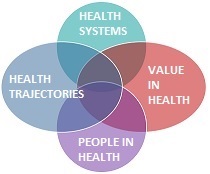Research
The main purpose of CEISUC is to contribute to the development in the field of economics applied to health and in health systems and services research. The main research areas are: Health Systems, Value in Health, People in Health and Trajectories in Health. |
  |
Health Systems
Within the research area ‘health systems’ we deal with the overall governance of the system. It includes the analysis of the evidence-based health policy-making through comprehensive and rigorous analysis of the dynamics of health care system in Portugal, the new primary care and hospital models of governance, the reconciliation of economic priorities with the psychological well-being in health organizations, the assessment of equity in the access to healthcare services, as well as the monitoring of audit systems.
Value in Health
In the research area ‘value in health’ we share the idea that the main mission of health care is to achieve the most value for patients, aiming, at the same time, at abetter sustainability of health system. Therefore, this area deals with the value that individuals assign to the various health states, firstly through preference-based utility measures and then, through effectiveness and health status/quality of life measures. However, in order to be administered, these measures have to be culturally adapted and validated to the Portuguese language and cultures, thus CEISUC maintains a running project, called RIMAS, aimed at analyzing methodological issues in quality of life assessment.
People in Health
The third research area called ‘people in health’ addresses the human component of healthcare, including people, users, caregivers, and healthcare providers. Increasing attention is being paid to involving users in the healthcare. The immense literature on experiences of interaction between health systems and their beneficiaries, allows us to sketch a classification of numerous initiatives and mechanisms for empowerment and for the involvement of citizens in the following: citizen participation; public consultation; and public information. CEISUC has been especially involved in addressing the last two issues. On the other hand, in European societies, the aging population is growing and the increase of pathological situations inducing immobility is notorious. Therefore, the need for having people available at home to provide the necessary support to patients, other than healthcare professionals, is raising. However, people who provide this type of support, in particular family caregivers, are also normally burdened by their own labor, domestic and family activities. Finally, attention should be paid to professional satisfaction taking into account changes in the Portuguese model of the public healthcare organizations, namely in the management rules, and in the redefinition of the supply.
Health Trajectories
Lastly, the research area ‘health trajectories’, deals with health over time for individual the public, families, or communities. Life expectancy and health-adjusted life expectancy have increased substantially in the recent decades. At the same time, the interest for measuring functional limitations and disabilities has also increased as predictor variables of health status and health-related quality of life. It is assumed that the health of individuals is also dependent on the physical, social and economic environments to which they are exposed. So, CEISUC’s researchers are particularly involved in project addressing aging, chronic diseases and end-of-life care.
